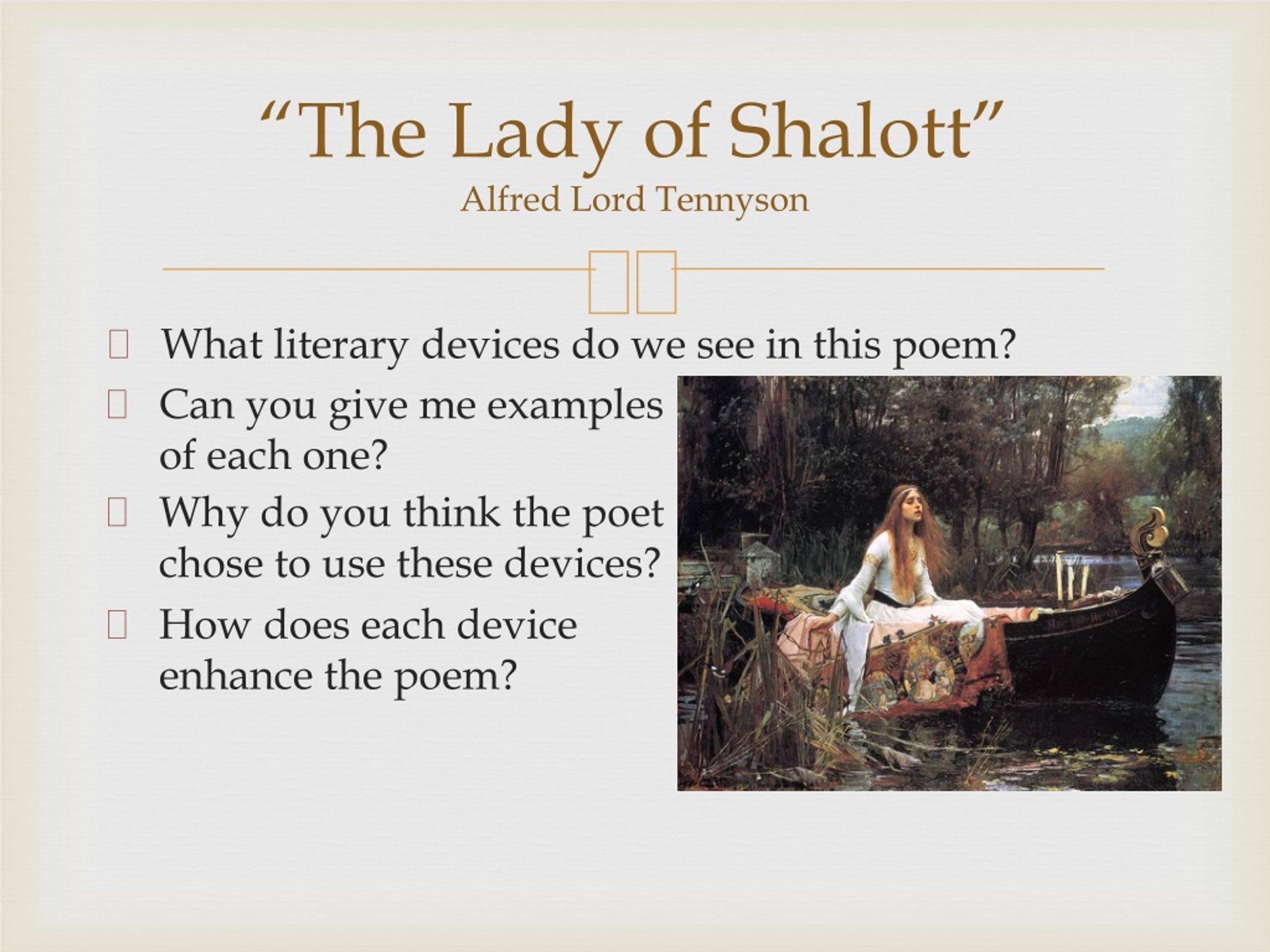Imagine being trapped in a tower, forbidden from looking directly at the world outside. The only glimpse you get is through a mirror reflecting the life that passes by. As you weave a tapestry of those fleeting images, your heart yearns for a connection to the vibrant world beyond your confines. This is the tragic tale of The Lady of Shalott, a poem by Alfred Tennyson that has captivated readers for centuries with its themes of isolation, longing, and the allure of the forbidden.

Image: arrownsa.blogg.se
The Lady of Shalott, perhaps one of Tennyson’s most famous works, is a narrative poem that invites us into a world where isolation and yearning collide, creating a poignant and evocative tale. The poem, in its various forms, including the original 1832 version and the later revised version of 1842, has become a literary touchstone for its exploration of themes that resonate deeply with readers across time and cultures. It’s not just a poem; it’s an invitation to explore the human condition, to delve into the depths of isolation and the pull of the unknown, and to contemplate the seductive power of the forbidden.
The Lady of Shalott: A Journey into the Depths of Isolation
The poem begins with a description of the Lady’s isolation, confined to her tower, only allowed to see the world through a magical mirror. The mirror, a symbol of her restricted reality, reflects a world that is both beautiful and tragically out of reach. The Lady weaves a tapestry of these reflected images, creating a vibrant record of the life she can only observe.
“She knows not what the curse may be,
And so she weaveth steadily,
And little other care hath she,
The Lady of Shalott.”
Her life, though monotonous and restricted, allows her a sense of creative control and fulfillment. It is her only connection to the world beyond her walls. However, this fragile balance is shattered by the arrival of Sir Lancelot, a knight whose arrival signals a turning point in the Lady’s life.
The Fatal Attraction of the Forbidden
The moment Lancelot rides past her tower, the Lady breaks her solitary confinement. The sight of this knight, a symbol of the world she craves, is too alluring to resist. She cannot resist the pull of the forbidden, the call of a world she can only observe from afar. The Lady, yearning for connection, chooses to look directly at the world she has been forbidden to see, an act that sets in motion her tragic fate.
“She left the web, she left the loom,
She made three paces thro’ the room,
And with a desperate cry
Leapt on her horse and rode away…”
Her transgression leads to a series of consequences, culminating in her death. This act of defiance, a desperate attempt to break free from her isolation, leads to her demise.
The Tragic Beauty of The Lady of Shalott
The final lines of the poem paint a picture of tragedy. The Lady, with Lancelot’s name on her lips, floats downstream to Camelot, her fate forever tied to this forbidden connection. The Lady of Shalott, a victim of her own yearning, embodies a timeless struggle between isolation and connection, between the allure of the forbidden and the consequences of transgressing boundaries.
“And in the stream she found her death,
And down the river past the town
With weary eyes of love she went,
And on the lighter wave she went
And down the river past the town
She went to Camelot.”

Image: 12honorsphs.weebly.com
The Poem’s Enduring Power
The Lady of Shalott, a poem that transcends time, continues to resonate with audiences today. It explores universal themes of isolation, longing, and the seductive nature of the forbidden. It serves as a timeless reminder of the power of human yearning, the fragility of boundaries, and the tragic consequences of defying fate.
A Deeper Dive into the Poem’s Symbolism
The poem is rich with symbolism, each element adding depth to the narrative.
- The Tower: Represents isolation and confinement, a symbol of the Lady’s restricted world.
- The Mirror: Represents the Lady’s limited view of the world, a reflection of reality but not reality itself.
- The Tapestry: Represents the Lady’s creative expression, the only outlet for her emotions and her connection to the world around her.
- Sir Lancelot: Represents the world outside the Lady’s isolation, the allure of the forbidden, the symbol of human connection and freedom.
- The River: Represents the flow of time, the inevitability of fate, the journey from isolation to inevitable ending.
The Lady of Shalott: A Timeless Tale
The Lady of Shalott is not just a story; it is a poignant exploration of the human condition. It speaks to the universal desire for connection and the often painful consequences of seeking it. It reminds us that the allure of the forbidden can be seductive, but it can also lead to our downfall.
The Lady Of Shalott Poem Pdf
Exploring The Lady of Shalott
The Lady of Shalott continues to inspire artists and writers across many mediums, from paintings and sculptures to operas and film adaptations. It is a testament to Tennyson’s enduring artistic power and a reminder of the enduring nature of human desire and tragedy.
If you haven’t already, I highly encourage you to seek out The Lady of Shalott poem PDF and immerse yourself in its timeless narrative. It will leave you captivated with its haunting beauty and its enduring exploration of the human condition.






